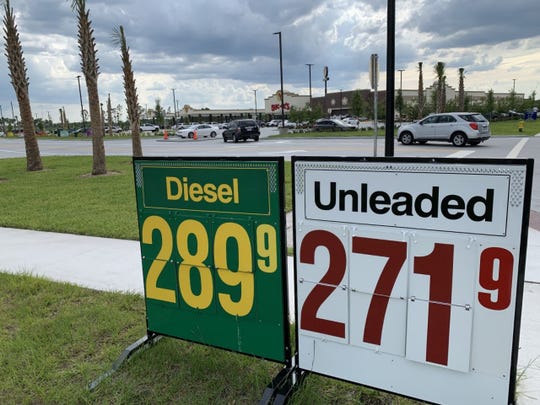What you need to know about the Colonial Pipeline cyberattack, gas prices, shortages
Like a clot that cuts off blood flow to the body, a cyberattack on a key artery in the nation’s energy infrastructure has temporarily disrupted the transportation of fuel in the Southeastern U.S.
The ransomware attack on the Colonial Pipeline is threatening to cause gas shortages and could affect prices if it continues longer than expected.
While experts are cautioning drivers not to rush to fill up, government officials are taking steps to protect Americans from gasoline price spikes and ensure that fuel can be shipped in other ways.
To be sure, the Colonial Pipeline says it’s aiming to “substantially” restore service by the end of the week, which would likely limit most of the fallout. But in the next few days, motorists could feel the effects.
Save better, spend better: Money tips and advice delivered right to your inbox. Sign up for free here
Cyberattack: Colonial Pipeline looking to ‘substantially’ restore operations by end of week
“You’re going to see some outages,” said Patrick DeHaan, head of petroleum analysis at fuel-savings app GasBuddy, which tracks prices and shortages.
Here’s what you need to know:
What parts of East Coast could feel shortages?
The Colonial Pipeline system delivers about 45% of the fuel for the East Coast, including gasoline and jet fuel. It runs more than 5,500 miles from Texas to New Jersey.
States like Georgia, South Carolina, North Carolina, Florida and Virginia may be especially vulnerable because they have limited options in terms of fuel transportation alternatives. Gulf Coast states can rely more easily on shipments from tankers.
How many stations are out of gas?
As of mid-morning Tuesday, Virginia was in the worst shape with about 7.5% of stations out, according to GasBuddy. North Carolina was the next worst at 5.4%, while 3.8% of Georgia stations were out, and 1.7% of South Carolina stations were down.
If the situation isn’t fixed soon, more stations that rely on the Colonial Pipeline for supply could begin running short.
At a Citi Stop station in Asheville, North Carolina, employee Jessica Alcocer said the store ran out of gas on Monday afternoon.
“Everyone’s panicking,” she said.
Should you fuel up now?
Only if you have to.
DeHaan urged drivers not to panic in states along the Gulf and southeastern Atlantic coasts.
Don’t “go out and hoard gasoline and make the problem much worse,” he sai.
Will prices spike?
The national average is not likely to be affected by more than a few pennies, according to DeHaan and Oil Price Information Service analyst Tom Kloza.
The national average price of gas was $2.99 a gallon on Tuesday, up 2 cents from a day earlier, according to AAA.
“Events like these are not necessarily big price movers,” DeHaan said. “This is more of a supply challenge.”
Signs in front of the Buc-ee's gas station/travel convenience center in Daytona Beach show the price for regular unleaded gasoline is $2.719 per gallon as of late afternoon Monday, May 10, 2021. (Photo: Clayton Park/News-Journal)
Still, local prices have already increased in some areas.
In South Carolina, average prices rose 6 cents per gallon to $2.74 on Tuesday from $2.68 on Monday, though the state continues to have the eighth-cheapest gas in the country.
Analysts say most states are unlikely to experience a significant uptick unless the outage extends longer than anticipated.
What’s more, some price increases can be attributed to other factors, including the easement of COVID-19-related shutdowns, which is boosting the economy and demand for gas, said Brian Bethune, a professor of applied economics at Boston College.
How did this happen?
We’re not exactly sure yet.
The FBI has said that an online gang known as DarkSide struck the Colonial Pipeline system with a ransomware attack, which takes computerized systems hostage until a payment is made.
“We continue to work with the company and our government partners on the investigation,” the FBI said.
How are governments, like in Georgia, responding?
The federal government has temporarily allowed tanker drivers to exceed statutory limits on their drive time to help make up for some of the lost capacity from the pipeline.
“We continue to evaluate product inventory in storage tanks at our facilities and others along our system and are working with our shippers to move this product to terminals for local delivery,” Colonial Pipeline said Monday in a statement.
In Georgia, Gov. Brian Kemp has taken several measures, including temporarily cutting fuel taxes.
“We are taking action to relieve some of the cost burden from Georgians as Colonial recovers by suspending fuel taxes, increasing the weight limit for supply trucks, and prohibiting price gouging,” Kemp said in a statement. “We expect these measures to be temporary as Colonial plans to be fully up and running later this week.”
He added: “There is no need to rush to the gas station to fill up every tank you have and hoard gas. With the measures we have taken today, I am hopeful we can get more supply to stations and get through to this weekend when we hope Colonial will return to normal.”
In North Carolina, Gov. Roy Cooper declared a state of emergency and suspended “motor vehicle fuel regulations to ensure adequate fuel supply throughout the state.”
Could a hack happen again?
Yes. The episode illustrates how vulnerable the nation’s energy infrastructure is to infiltration.
“It absolutely exposes a major vulnerability,” DeHaan said.
Kloza says it’s a “wakeup call” for the energy industry, adding “Imagine if it was one of the power companies.”
How can I preserve gas in my tank?
Here are some tips to consider.
- Plan ahead to accomplish multiple errands in one trip, and whenever possible avoid high-traffic times of day.
- If you own more than one car, use the most fuel-efficient model that meets the needs of any given journey.
- Remove unnecessary and bulky items from your car. Minimize your use of roof racks and remove special carriers when not in use. It takes more fuel to accelerate a heavier car, and the reduction in fuel economy is greater for small cars than for larger models.
- Minimize your use of air conditioning. Even at highway speeds, open windows have less effect on fuel economy than the engine power required to operate the air conditioning compressor.
- In hot weather, park in the shade or use a windshield sunscreen to lessen heat buildup inside the car. This reduces the need for air conditioning (and thus fuel) to cool down the car.
Contributing: Mackensy Lunsford of the Asheville Citizen-Times: Nicholas Katzban of NorthJersey.com.
You can follow USA TODAY reporter Nathan Bomey on Twitter @NathanBomey and subscribe to our free Daily Money newsletter here for personal finance tips and business news every Monday through Friday morning.
Source: Read Full Article


